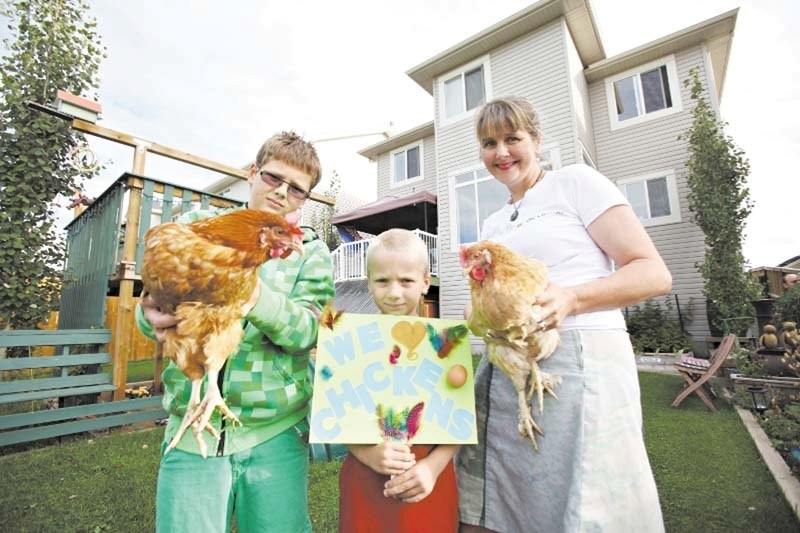What council clucked as a well-poised presentation for a possible hen pilot project in Cochrane could bring good news to those in support of the idea.
Presenters Jennifer Walden and Shawna Kerr-Smith advocated for a project that would meet the town’s sustainability plan, tie in with Cochrane’s heritage and fall in line with the 15 other Alberta communities (150 across Canada) that have run similar hen pilots, many going on to become bylaw.
Council will be consulting with other comparable communities and revisiting the pilot project in early 2017 – possibly in the form of an open house or public hearing to get the ball rolling.
“I appreciate that even though some of the councillors personally aren’t keen about chickens, they seem willing to put their personal feelings aside to take into consideration what the public interests are,” said Kerr-Smith following the presentation.
“I think it’s really important we’re all responsible about this and everyone knows the rules and follows the rules,” said Walden, initiator of the Cochrane chapter of CLUCK (Canadian Liberated Urban Chicken Klub).
The presenters addressed the spectrum of positives with backyard hens, as well as common concerns.
They highlighted successful projects in communities such as Black Diamond, Turner Valley and Okotoks – the latter made its urban hen pilot a permanent bylaw last month.
Okotoks council, which voted 4-3 in favour of a one-year pilot in 2014, voted unanimously in favour of implementing a permanent hen program, moving the number of participant households allowed to 18 from 12.
These communities reported no complaints following the implementation of their urban hen programs.
Paul Hughes, Calgary food activist and founder of CLUCK, made an early appearance to wish supporters well.
Hughes has been a vocal advocate on such issues as food access and security and even though his appeal to Calgary council for an urban hen pilot has been struck down twice in five years, he encourages communities to continue to push the movement forward from a grassroots level.
“When Okotoks put this one forward I just knew something was going to happen and this literally took you only three weeks,” said Mayor Ivan Brooker, who added that he is keen to learn more from other communities even though he remains uncertain of how he personally feels about urban hens.
“I’m kind of disappointed that we’re so far behind the eight-ball on this one,” said Coun. Gaynor Levisky, applauding the notion as “sustainable.”
Coun. Ross Watson was favourable about the potential but did raise such concerns as chickens being attractants for coyotes, foxes or other predators.
“I have lots of questions – not that I don’t support this – but I’m glad we aren’t first out of the gate on this one,” remarked Coun. Mary Lou Eckmeier.
Coun. Tara McFadden and Morgan Nagel both seemed reserved, yet cautiously optimistic that anything can happen.
Walden said their research indicated urban hens did not result in increased predator issues compared to household pets, as proper coop care (including height and size restrictions) and locking hens up at night are standard practice.
The presenters addressed the issue of noise, noting their recommendation to only include hens (no roosters) would eliminate any concerns as hens themselves are not loud animals.
They also provided research from GRAIN, an international sustainable agriculture group, that indicates factory farming is to linked health concerns such as salmonella and bird flu and that backyard hens are part of the solution, not the problem.
“It really comes down to responsible pet ownership … once we take (chickens) out of the livestock category (of the bylaw), this is a pet, so it would be the same way you would monitor a dog,” said Walden, when asked about accountability.
She added that most other communities manage their program through the development of a specific bylaw and that any complaints would be investigated by a bylaw officer (like any other animal bylaw infractions).
A recent online Cochrane Eagle poll indicated 63 per cent support for an urban hen pilot project.
Urban chicken pilot recommendations:
• A cap on number of participants (Okotoks limits one hen household per every 1,500 residents)
• That Cochranites who intend to participate in the pilot would attend a mandatory workshop (Walden said she has educators lined up to provide free workshops)
• That participants undergo an application process and pay an administrative fee
• That the number of hens be capped with a recommendation of at least three and no more than six hens per participating household (no rooster allowed, in order to minimize noise)
• that a bylaw would be created allowing for municipal enforcement to monitor and fine any participants who did not abide by the perimeters of the bylaw, including cleanliness and noise.




